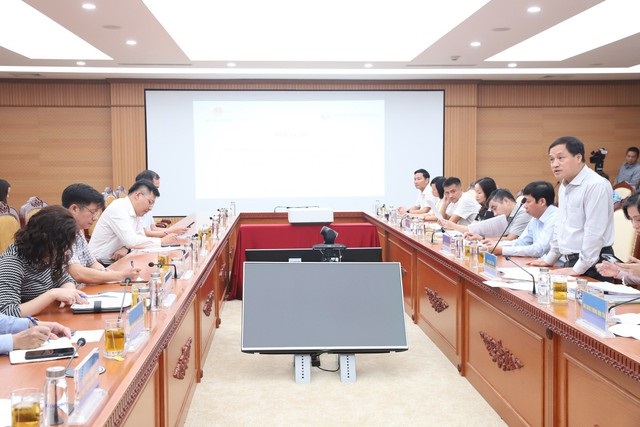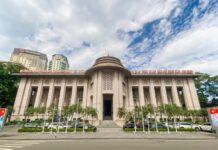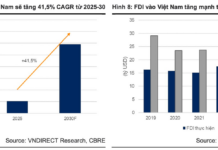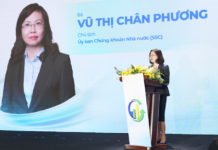
Conference on disbursement of foreign capital investment in the first months of 2024 and measures to enhance disbursement in 2024 – Photo: VGP/HT
|
On May 21, the Ministry of Finance organized a conference on the disbursement of foreign capital investment in the first months of 2024 and measures to enhance disbursement for the rest of the year.
Low Disbursement Rate
Speaking at the conference, Mr. Vo Huu Hien, Deputy Director of the Department of Debt Management and External Finance (Ministry of Finance), said that completing the disbursement of the 2024 capital investment plan is an important task, contributing to the promotion of socio-economic development.
To accelerate the disbursement of the 2024 investment capital source, in the past time, Minister Ho Duc Phoc has directed the entire financial sector to synchronously implement solutions, including foreign borrowed capital, such as: Sending documents to ministries, central agencies and localities requesting them to urgently allocate details of the 2024 state budget capital investment plan, the plan for foreign capital, and import the estimates on the TABMIS system.
At the same time, the Ministry of Finance has organized delegations to work with 2 ministries (Ministry of Transport, Ministry of Agriculture and Rural Development) and 3 localities (Thanh Hoa, Thua Thien Hue and Dak Lak) to grasp the disbursement situation and handle difficulties and problems in disbursement and payment procedures, and issues affecting the progress of project implementation; reviewing the procedure for receiving and handling withdrawal applications to ensure the shortest time (maximum 1 working day for direct payment applications) and returning them immediately to the project owners if the dossiers are incomplete; exchanging and working with donors to speed up the progress of negotiation, signing and effectiveness of loan agreements for projects that have completed investment procedures…
However, the results of foreign capital disbursement in the first 5 months of 2024 (as of May 15, 2024) of localities are still low.
In 2024, localities were assigned a total capital plan of VND 24,172.86 billion, of which investment capital was VND 9,456.86 billion (53/63 localities), and re-lent capital was VND 14,716 billion (51/63 localities). As of May 15, 2024, the rate of capital plans that localities have allocated and imported into TABMIS for central budget investment projects is 91.7% of the assigned capital plan, and the re-lent capital is 84.2% of the assigned capital plan.
The cumulative disbursement of foreign capital of localities as of May 15, 2024 was 5.7% of the assigned capital plan (for both allocated and re-lent capital plans), higher than the same period in 2023 (4.9%). Only 5/53 localities have a disbursement rate of over 15%, and 28/53 localities have not disbursed the central budget capital allocated as additional targets for local budgets.
‘Naming’ difficulties in disbursement
At the conference, ministries and branches discussed and identified the reasons for the slow disbursement, including some main reasons such as: slow site clearance, slow bidding and technical design; projects must carry out procedures for adjusting investment policies, project adjustment, loan agreements; slow to receive the non-objection opinion of the sponsor for the dossiers…
In addition, in the first months of the year, some ministries and branches still focus on disbursing the 2023 capital plan. According to Mr. Nguyen Thanh Tuan, Director of the World Bank Project Management Board (Vietnam National University, Hanoi), up to now, this unit has completed the allocation and import of foreign investment capital estimates for 2024; The unit (World Bank Project Management Board) has received more than VND 645 billion of foreign investment capital in 2024 on the public service.
In the process of using this capital source, Vietnam National University, Hanoi is facing some difficulties. Specifically, according to the requirements of the Sponsor, some of the following activities need to get the “No Objection – NOL” opinion from the Sponsor before implementation such as: Overall project plan, Annual plan, Project operation manual, Bidding plan for packages using foreign borrowed capital, Terms of reference for consulting bidding packages, Invitation to bid and Selection results of the bidder before signing the contract with the winning bidder. Accordingly, the implementation time of these tasks is often prolonged because it is necessary to continuously update and adjust before the Sponsor sends a “No Objection” letter to the units.
In addition, there are difficulties in payment because the project uses different sources of capital. This makes the control of payment procedures take a lot of time because the payment dossiers are appraised and controlled at the State Treasury and the Ministry of Finance before being sent to the Sponsor for payment to the contractor…
Mr. Nguyen Anh Dung, Deputy Director of the Investment Plan Department (Ministry of Transport), also shared that this ministry has the largest amount of ODA capital when it is assigned VND 4,366 billion in capital in 2024. The biggest difficulty affecting the disbursement process is related to site clearance. A typical example is the project of connecting traffic in the northern mountainous provinces, which is hindered because it goes through a lot of forest areas, and the procedure for converting forests takes up to 1.5 years. Therefore, site clearance costs are often increased by no small amount.
Similarly, the Ministry of Education and Training, in the first 6 months, almost no ODA capital was disbursed because this ministry was “stuck” in project appraisal, difficulty in finding an appraisal unit… Therefore, the ministry plans to strive to disburse VND 350 billion for the whole year, and the remaining VND 280 billion will be returned to the state budget.
Through the process of working with localities, projects and monitoring disbursement data of projects, the Ministry of Finance has identified the following difficulties and problems. First, difficulties in adjusting investment policies, project adjustment, extending the disbursement period, and extending the implementation period, using surplus capital. The main reason that projects have to apply for extension of the implementation period and disbursement period is that the project implementation procedures are slow and difficulties and problems arising have not been promptly handled. There are difficulties in the procedure for projects to extend the disbursement period after the localities have completed the procedures for extending the project investment (under the competence of the Provincial People’s Councils) but have not yet completed the procedures for extending the time of capital allocation (under the competence of the Government leaders).
Second, difficulties in implementing and disbursing investment with this group of difficulties are quite diverse, including: Difficulties in bidding or commercial contracts; difficulties in site clearance; difficulties due to design adjustments; slow progress in acceptance and payment. These are the responsibilities of the Provincial People’s Committees and the Project Management Boards.
Third, difficulties due to lack of capital plan (both allocation and re-lending). In 2024, some localities were confused in making capital plans, unable to foresee the progress of project implementation and the amount of capital needed for disbursement, so they made capital plans that were not close to reality, especially for projects with 2024 as the last year of disbursement, leading to lack of capital plan or no capital plan for disbursement.
Proposing some solutions to speed up disbursement
In order to strive to achieve a high disbursement rate for ODA and preferential foreign borrowed capital sources assigned by the Prime Minister in 2024, it is necessary to implement a number of solutions.
On the part of the Ministry of Finance, it is necessary to ensure the time to handle withdrawal applications in accordance with regulations; organize delegations to directly work, urge and remove difficulties and problems in public investment, focusing on large projects, localities that are assigned a lot of capital plans; continue to exchange with donors to remove difficulties and problems on the donor side such as shortening the time and simplifying the procedures for giving opinions of non-objection.
The Ministry of Planning and Investment should support localities to speed up the progress and procedures for extending the time of capital allocation to avoid affecting the disbursement progress of projects; guide more clearly to the localities about the competence to approve project adjustment for projects implemented in many agencies.
On the part of localities, it is necessary to review and evaluate in detail and specifically about the possibility of disbursement of each project, especially noting projects with the year of making the plan as the last year of disbursement to ensure sufficient capital for the projects, avoiding the extension of disbursement, extension of the implementation period, and arising many administrative procedures.
For cases where it is not possible to complete the project volume as planned, it is necessary to cut, reduce and transfer the assigned capital plan, and there must be a written proposal for cutting, reducing and transferring capital sent to the Ministry of Planning and Investment, the Ministry of Finance before June 30, 2024 for coordination.
For programs/projects that need to adjust investment policies, localities need to report and closely coordinate with the Ministry of Planning and Investment to submit to the Prime Minister for approval of the policy to adjust investment, on the basis of the Prime Minister’s approval/decision on adjusting investment policies, localities coordinate with the Ministry of Finance to adjust the disbursement period, adjust capital allocation according to signed loan agreements (if any).
For projects with difficulties in investment preparation and implementation, localities, the Ministry of Finance believes that the Project Management Boards have the responsibility to urgently complete the procedures for investment, construction, site clearance and resettlement, to implement the project; complete the technical designs, resolve difficulties and problems in bidding and contracts; soon handle difficulties and problems arising in each stage of project implementation.
The central project management boards of projects under the management of ministries and branches need to provide guidance and training on professional skills and capacity for local project management boards to ensure the synchronous and effective implementation of projects.





































